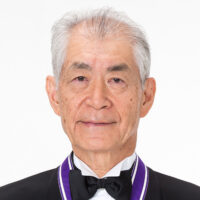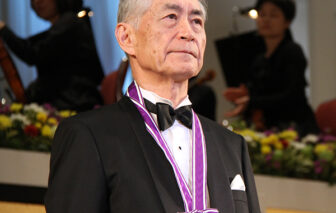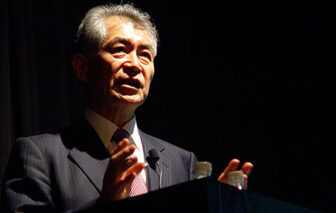
2016 Kyoto Prize Laureates
Life Sciences and Medicine(Molecular Biology, Cell Biology, Systems Biology, etc.)
/ Medical Scientist
1942 -
Professor, Kyoto University
Serendipities of Acquired Immunity
2016
11 /11 Fri
Place:Kyoto International Conference Center
From the Molecular Immunity to the Suppression of Cancer
2016
11 /12 Sat
13:30 - 17:30
Place:Clock Tower Centennial Hall, Kyoto University
Dr. Honjo has elucidated the mechanism for the functional diversification of antibodies by clarifying Class Switch Recombination and its responsible enzyme, AID. He also identified several important immunoregulatory molecules, including PD-1, whose function has led to the development of effective cancer immunotherapy. His discoveries and their clinical applications have significantly influenced research in the life sciences and medicine, resulting in eminent contributions to human welfare.
*This field then was Field of Life Sciences (Molecular Biology, Cell Biology, Neurobiology).
Antibodies, a major component of the immune system, are produced by B cells. The rearrangements of variable gene fragments of immunoglobulin (Ig) genes during the development of B cells in bone marrow provides antibodies binding activity to a vast variety of potential antigens. Upon activation by exposure to antigens and associated cytokine milieu in the secondary lymphoid tissues, B cells then produce antibodies of different classes such as IgM, IgA, IgG and IgE, which are different in biological functions and distribution on the body. Exposure to antigens also evokes somatic hypermutations (SHM) in the variable region, which confers higher binding affinity to particular antigens. However, how different classes of antibodies are produced and how SHM occurs remained long unknown.
In 1978, Dr. Tasuku Honjo proposed a class switch recombination (CSR) model of antibody class production, which he corroborated in subsequent works. According to this model, antibody class is determined by deleting a part of the immunoglobulin heavy chain gene and joining the region coding the corresponding class segment. He then established an in vitro model that recapitulates CSR using cultured B cells activated with interleukin (IL)-4, and cloned activation-induced cytidine deaminase (AID). Subsequent studies by his group proved that AID is not only responsible for CSR but also essential for SHM. Dr. Honjo thus identified the molecular mechanism underlying the generation of functionally divergent antibodies, thereby elucidating one of the basic principles of immunology.
In parallel with this study, Dr. Honjo cloned a variety of molecules that play important roles in immune responses. These include IL-4 and IL-5, which activate B cells and induce CSR; RBP-J kappa, which is a key mediator of Notch signaling in cell fate determination; and a chemokine SDF-1, which is important in hematopoietic niche formation in the bone marrow.
One of the molecules cloned by Dr. Honjo is PD-1, which negatively regulates the self-tolerance of the immune system, as evidenced by the development of various autoimmune diseases after deletion of this gene as well as suppression of T cell activation by binding to its specific ligand PD-L1. Based on these findings, Dr. Honjo and his colleagues administered anti-PD-L1 antibodies in mice bearing PD-L1-expressing tumors and found that blocking the PD-1-PD-L1 binding significantly inhibited tumor growth and prolonged survival. This milestone discovery by Dr. Honjo stimulated the development of anti-PD-1 and anti-PD-L1 antibodies as anti-cancer immunotherapeutic agents. Subsequent large-scale clinical trials using the humanized anti-PD-1 antibody demonstrated marked efficacy against various cancers in humans and the antibody drug is now in clinical use in Japan, the U.S., and Europe.
Dr. Honjo has thus contributed to basic science by clarifying the mechanism responsible for the functional diversification of antibodies, one of the basic principles of immunology, and by identifying several important immunoregulatory molecules. His identification of PD-1/PD-L1 and their function has led to the development of effective cancer immunotherapy contributing significantly to human health and welfare.
For these reasons, the Inamori Foundation is pleased to present the 2016 Kyoto Prize in Basic Sciences to Dr. Tasuku Honjo.
Profile is at the time of the award.

Dr. Tasuku Honjo awarded 2018 Nobel Prize
Congratulations on winning this year’s Nobel Prize in physiology or medicine. We are quite proud of Dr. Honjo’s achievement being highly acclaimed and leading to this accolade.

Dr. Tasuku Honjo, awarded Keio Medical Science Prize
On September 12, Keio University announced the 21st Keio Medical Science Prize laureates, and Dr. Tasuku Honjo (Medical Scientist, Professor of Kyoto University, 2016 Kyoto Prize laureate in Basic Sciences) was selected.